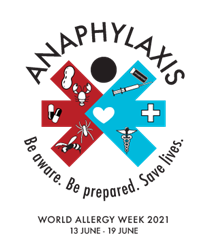
Anaphylaxis can happen anywhere – in schools, workplaces, homes, restaurants, and any places where there are allergens that can trigger severe reactions in people with allergies. Everyone should learn the early signs of anaphylaxis and be able to recognize it and act fast.
MILWAUKEE (PRWEB)
June 13, 2021
World Allergy Organization (WAO), serving its membership of professional allergy/immunology societies around the world, dedicates World Allergy Week, from June 13 to 19, 2021, to raising awareness of anaphylaxis triggers, identification, treatment, and prevention.
Anaphylaxis is a serious allergic reaction that comes on suddenly and severely after exposure to allergens, most commonly food, drugs, and insect venom, and can be fatal. Anaphylaxis involves the airway, breathing, or circulation (ABC). Features of anaphylaxis include asthma-like symptoms of a mild allergic reaction such as hay fever symptoms, itchy skin rash (hives), swelling of the lips or face, abdominal pain or vomiting. Anaphylactic shock is the most severe presentation, where insufficient blood is circulating around the body, resulting in collapse.
Motohiro Ebisawa, MD, PhD, of Sagamihara National Hospital in Sagamihara, Japan, and President of the World Allergy Organization, announced the focus of World Allergy Week 2021:
“This is about saving lives. Anaphylaxis can happen anywhere – in schools, workplaces, homes, restaurants, and any places where there are allergens that can trigger severe reactions in people with allergies. Everyone should learn the early signs of anaphylaxis and be able to recognize it and act fast.”
“The most effective way to treat anaphylaxis and prevent fatality is immediate injection of intramuscular epinephrine (adrenaline), by way of auto-injectors or pre-filled syringes – at the first sign of anaphylaxis – and call for an ambulance. People at risk of anaphylaxis should work with their allergy/immunology specialists to learn how and when to self-inject epinephrine (adrenaline), and develop an emergency plan – keeping the medicine and the plan with them at all times.”
The importance of addressing the lack of availability of epinephrine/adrenaline in some parts of the world is one of the topics experts will discuss in “SToP Anaphylaxis!”, a complimentary webinar on Thursday, June 17, beginning at 7:00 am CDT. Find your local time by clicking here: https://www.timeanddate.com/worldclock/converter-classic.html. A live question-and-answer session will follow the presentations. The program will offer information for both a general audience and physicians. Details and registration are available here: https://www.pathlms.com/wao/courses/32573/webinars/22426.
To learn more about anaphylaxis, visit http://www.worldallergyweek.org, and attend the webinar. To find a professional allergy/immunology member society of the World Allergy Organization in your country or region, visit: http://www.worldallergy.org/about-wao/member-societies.
Note to journalists: See “World Allergy Organization Anaphylaxis Guidance 2020”, World Allergy Organization Journal 2020;13(10):100472 (30 October). DOI: https://doi.org/10.1016/j.waojou.2020.100472
___________
About the World Allergy Organization
The World Allergy Organization (WAO) is an international alliance of 104 regional and national allergy, asthma and immunology societies. Through collaboration with its Member Societies WAO provides a wide range of educational and outreach programs, symposia and lectureships to allergists/immunologists around the world and conducts initiatives related to clinical practice, service provision, and physical training in order to better understand and address the challenges facing allergists/immunologists worldwide. (http://www.worldallergy.org)
Share article on social media or email:

